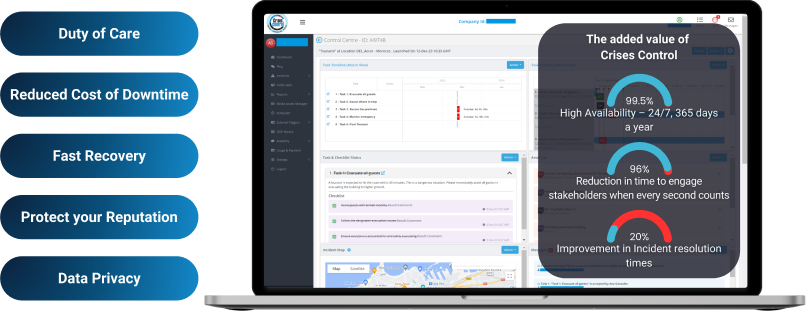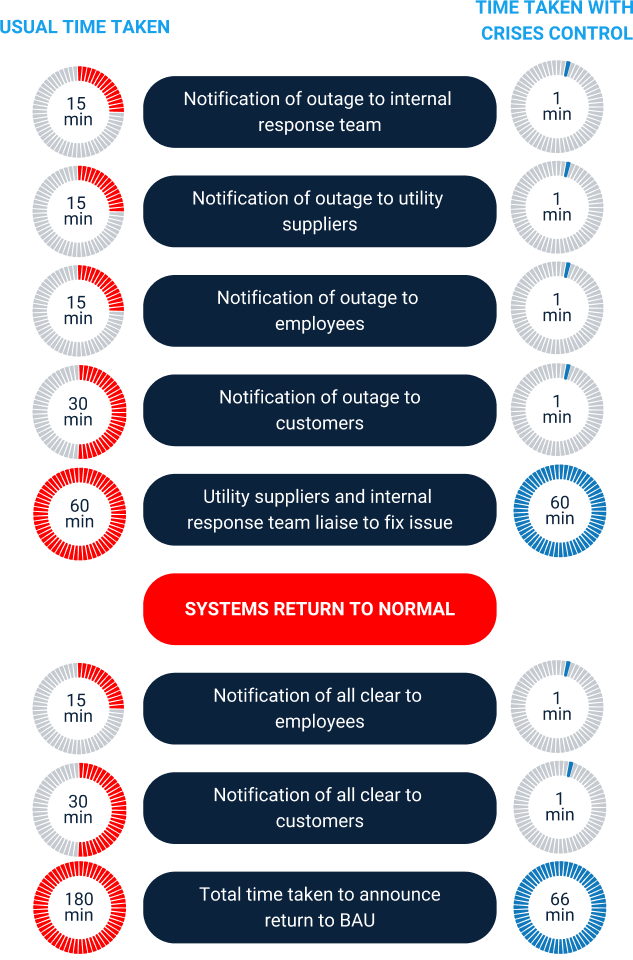Written by Anneri Fourie | Marketing Executive
In today’s fast-paced business environment, disruptions are inevitable. From IT outages to security breaches, these events can cripple operations, damage reputations, and cost companies dearly. That’s where Crisis Management comes in, but how do you measure the return on investment (ROI) of a crisis management solution like Crises Control?
This blog dives deep into the value proposition of Crises Control, exploring how it demonstrably improves an organisation’s ROI through:
- Reduced Downtime: Discover how Crises Control minimises business disruption by streamlining communication during critical events.
- Enhanced Efficiency: We’ll explore how the platform optimises response times, saving valuable resources and minimising downtime.
- Improved Stakeholder Engagement: Learn how Crises Control fosters clear and timely communication with all stakeholders, minimising confusion and fostering trust.
What is ROI and Why is it Important?
Understanding ROI
Return on Investment (ROI) is a key performance indicator that measures the profitability of an investment relative to its cost. It is calculated by dividing the net profit from an investment by the initial cost of the investment and then multiplying by 100 to get a percentage. ROI is crucial for businesses as it helps determine the efficiency of investments and guides decision-making processes. High ROI indicates that the investment gains compare favourably to its cost.
The Importance of ROI
- Performance Measurement: ROI helps businesses evaluate the performance of their investments, ensuring resources are used effectively.
- Decision Making: By analysing ROI, companies can make informed decisions about where to allocate resources for maximum benefit.
- Profitability Analysis: It provides a clear picture of profitability, allowing businesses to focus on high-return activities.
- Benchmarking: ROI serves as a benchmark for comparing the profitability of different investments or projects.
How Crises Control Helps Your ROI
Crises Control revolutionises crisis management by providing a robust platform that streamlines communication and response processes. Here’s how:
Immediate Incident Notification
When an incident occurs, timely notification is critical. Crises Control’s multi-channel incident function ensures that your internal response team, utility suppliers, employees, and customers are notified instantly. This rapid dissemination of information significantly reduces downtime.
- Internal Response Team: Notified within 1 minute.
- Utility Suppliers: Notified within 1 minute.
- Employees: Notified within 1 minute.
- Customers: Notified within 1 minute.
In contrast, traditional methods can take up to 30 minutes just to notify customers alone, leading to prolonged disruptions and higher costs.
Cost Savings from Reduced Downtime
According to the Databarracks Health Check Report, an IT outage can cost small businesses up to £5,000 an hour and large businesses up to £50,000 an hour. By using Crises Control, a technology managed services company reduced their downtime from 3 hours to just over 1 hour, saving up to £10,000 in downtime costs.
Streamlined Communication
Crises Control’s mass notification software ensures that all stakeholders are kept informed through SMS, phone calls, emails, and push notifications. This multi-channel approach ensures that messages are received and acted upon promptly, minimising confusion and delays.
- Pre-populated Messages: Use pre-populated messages for quick communication.
- Ping Notifications: Nudge utility suppliers into action with a simple ping.
Comprehensive Audit and Improvement
The Crises Control dashboard provides an audit trail of all messages sent and acknowledgments received. This feature allows your response team to review incidents, learn from them, and continuously improve your crisis management processes. This continuous improvement leads to faster and more efficient responses in future incidents, enhancing your ROI.
Case Study: Real-World Impact
A technology managed services company with 150 employees across London, India, and the Philippines experienced an IT and telecoms outage due to a power supply interruption at their head office in London. Using Crises Control, they significantly reduced the time to notify all stakeholders and return to BAU.
Traditional Method: 180 minutes to return to BAU.
Crises Control: 66 minutes to return to BAU.
Savings: 300 hours of employee time and up to £10,000 in downtime costs.
This case study demonstrates the tangible benefits of using Crises Control, showcasing how it can dramatically improve your ROI by reducing downtime and enhancing communication efficiency.
Five Compelling Reasons to Adopt Crises Control

We’ve established that Crises Control delivers a robust ROI, but let’s delve deeper and explore how it specifically addresses the challenges you mentioned:
Duty of Care: Ensuring Staff Safety and Legal Compliance
In today’s world, executives have a legal and ethical obligation to protect their employees during emergencies. Crises Control empowers you to fulfil this duty in several ways:
- Rapid Multi-Channel Communication: Crises Control allows you to instantly notify staff via various channels, including SMS, phone calls, email, and push notifications. This ensures everyone receives critical information and knows how to respond quickly.
- Streamlined Evacuation Procedures: The platform facilitates the creation and dissemination of clear evacuation plans, minimising confusion and ensuring a safe and orderly evacuation if necessary.
- Real-Time Situational Awareness: Crises Control provides a centralised platform for sharing updates and critical information, keeping everyone informed and enabling informed decision-making.
- Audit Trail and Reporting: Crises Control maintains a detailed record of all communication, demonstrating your commitment to staff safety and aiding in post-incident analysis and compliance audits.
By fulfilling your duty of care, you not only protect your employees, but also mitigate legal risks and potential lawsuits.
Cost of Downtime: Minimising Disruption and Lost Revenue
As we saw earlier, downtime translates to lost revenue. Here’s how Crises Control helps you minimise these costs:
- Faster Incident Response: Crises Control facilitates rapid communication with internal teams and external partners, accelerating problem resolution and minimising the duration of downtime.
- Improved Collaboration: The platform provides a central hub for collaboration, enabling teams to work together seamlessly to resolve issues quickly and efficiently.
- Automated Workflows: Crises Control automates manual tasks associated with incident response, freeing up valuable resources and allowing your team to focus on resolving the core issue.
- Reduced Communication Overhead: The platform streamlines communication by eliminating the need for multiple phone calls and emails. This saves time and reduces the risk of miscommunication.
By minimising downtime, Crises Control helps you get your business back up and running faster, minimising lost revenue and protecting your bottom line.
Unplanned Outages: Speeding Up Recovery from Disruptions
Unplanned outages are a fact of business life. Here’s why Crises Control is vital for navigating these disruptions:
- Pre-defined Templates: Crises Control allows you to create pre-defined templates for various outage scenarios. This eliminates the need to draft messages from scratch during a crisis, saving valuable time.
- Mass Notification System: The platform allows for instant mass notification of all stakeholders, including employees, customers, and suppliers. This ensures everyone is aware of the outage and can take necessary actions.
- Incident Management Tools: Crises Control provides a suite of tools to track progress, manage resources, and document all actions taken during the outage. This facilitates a structured and efficient recovery process.
- Improved Business Continuity: By enabling faster recovery from unplanned outages, Crises Control minimises business disruption and ensures continuity of operations.
By expediting your response to unplanned outages, Crises Control helps you minimise their impact and get your business back on track quickly.
Reputational Damage: Maintaining Trust During a Crisis
A poorly managed crisis can severely damage your brand reputation. Here’s how Crises Control helps you navigate a crisis effectively:
- Controlled Communication: Crises Control allows you to manage and control the flow of information during a crisis. This ensures consistent, accurate messaging reaches all stakeholders.
- Transparency and Visibility: The platform facilitates transparent communication, keeping stakeholders informed about the situation and the steps you’re taking to resolve it.
- Improved Customer Relationships: By maintaining open communication during a crisis, Crises Control helps you build trust and confidence with your customers, minimising long-term damage to your reputation.
- Social Media Monitoring: Crises Control offers social media monitoring tools to track online conversations and sentiment surrounding your brand during a crisis. This allows you to proactively address concerns and mitigate negative publicity.
By facilitating clear and consistent communication during a crisis, Crises Control helps you protect your reputation and maintain trust with your stakeholders.
Data Privacy: Ensuring Compliance and Mitigating Risk
Data breaches and other privacy violations can lead to hefty fines and reputational damage. Here’s how Crises Control helps you manage data privacy risks:
- Secure Communication Channels: Crises Control provides secure communication channels to ensure sensitive information is protected during a crisis.
- Data Breach Management Tools: The platform offers tools to identify, contain, and report data breaches efficiently, minimising their impact.
- Compliance Management: Crises Control can help you track and manage compliance with relevant data privacy regulations, such as GDPR. This reduces the risk of regulatory fines and penalties associated with data breaches.
By implementing secure communication protocols and offering data breach management tools, Crises Control empowers you to safeguard sensitive data, minimise risks, and ensure compliance with data privacy regulations.
Summary
To summarise how Crises Control can boost your ROI, have a look at the illustration below:

Conclusion: Boost Your ROI with Crises Control
Investing in Crises Control not only enhances your crisis management capabilities, but also significantly boosts your ROI by reducing downtime, streamlining communication, and ensuring continuous improvement. Don’t let disruptions cripple your business—take proactive steps to safeguard your operations and profitability.
Ready to see the difference Crises Control can make for your business? Contact us today to get a free demo and discover how we can help you maximise your ROI with our cutting-edge mass notification software and crisis management solutions.
By adopting Crises Control, you can ensure that your business remains resilient, your stakeholders stay informed, and your ROI continues to grow. Don’t wait for the next crisis—be prepared with Crises Control.
Request a FREE Demo
Interested in our Award-Winning Software?
FAQs
1. How can Crises Control improve my ROI?
Crises Control helps you respond to crises faster and recover quicker. Studies show a 96% improvement in engaging responders and a 20% improvement in recovery time. This means less downtime, less damage, and a faster return to normal operations, all contributing to a stronger ROI.
2. What are the benefits of the Crises Control communication platform?
Our two-way platform facilitates real-time communication between responders and managers. This streamlines decision-making and ensures everyone is on the same page, leading to a faster and more effective crisis response.
3. Does Crises Control offer any tools to help with recovery after a crisis?
Absolutely. Crises Control provides pre-built templates, automated workflows, and other features to keep your team organised and efficient during recovery. This minimises wasted time and gets your business back on track faster.
4. How can Crises Control help me prevent future crises?
The platform creates a record of past events and communication, allowing you to analyse what went well and what could be improved. This helps identify weaknesses and implement preventative measures to avoid similar situations in the future.
5. Is Crises Control just a reactive tool?
Crises Control goes beyond reacting to emergencies. It helps you prepare for potential threats by establishing communication plans and assigning roles beforehand. This proactive approach minimises panic, protects your reputation, and fosters a culture of crisis readiness.
